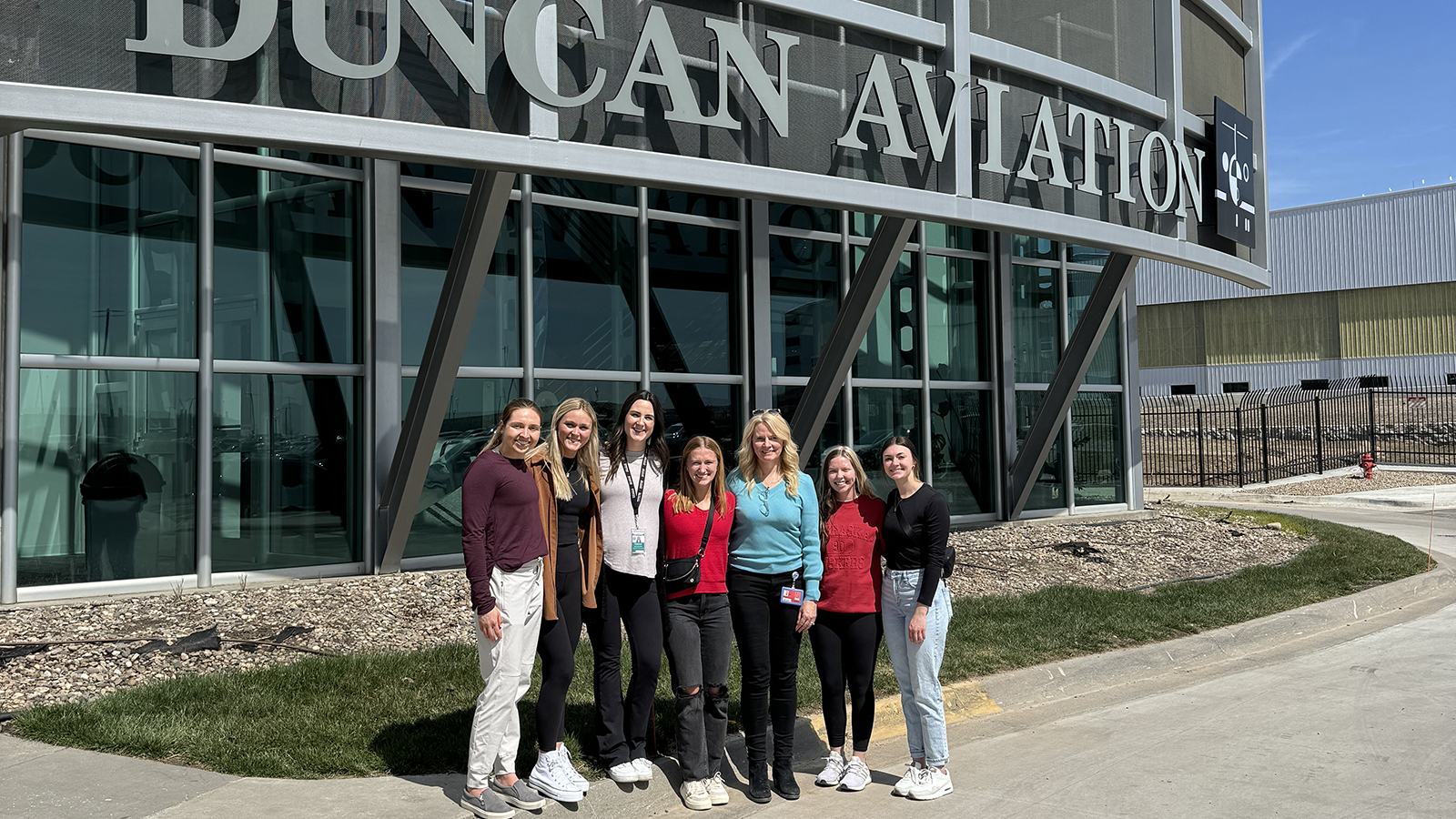
Community collaboration, guest speakers provide real-world application opportunities for NHS grad students
04 Apr 2024 By Kelcey Buck
A semester-long group project collaboration with Duncan Aviation and guest speakers from Nebraska Extension are helping University of Nebraska-Lincoln Nutrition and Health Sciences graduate students gain applied skills of the evidence-based knowledge learned in class on the principles of health program organization and management.
The NUTR 976 course, Organization and Management in Community Nutrition and Health Promotion, was created in 2022 with the goal to create a comprehensive curriculum that includes health program planning from the organizational and management aspect. Assistant professor of practice Sarah Hortman utilizes her 25 years as a registered dietitian with community nutrition and public health expertise to teach the course. The content is important for students choosing careers working in health and wellness programs either in the community or for organizations including government, health, and corporate areas.
“Health promotion and disease prevention is carried out through programs, so understanding the management role at this level is crucial,” Hortman said. “There is also application to those students who choose clinical and research paths as health programs and interventions are also carried out in those career settings.”
The semester-long group project is an ongoing partnership with Duncan Aviation that was established when Hortman created this new course in Spring 2022. Students use employee health and wellness data provided by Duncan Aviation Wellness Coordinator Peyton Janicek to develop a wellness program that expands the students’ knowledge and experience through real-world application of the course content.
“This collaboration for the Nutrition 976 class has been special to me, personally, as I was once a student at the University of Nebraska-Lincoln interested in community nutrition myself,” said Janicek, who is a registered dietitian and licensed medical nutrition therapist. “This collaboration helps the students to better understand what a role in community nutrition might look like, and I feel that Duncan Aviation’s Wellness Program is a prime example for the students to see.”
Students complete eight steps on their way to developing the health promotion program from conducting assessments to designing the program components to communicating and marketing the wellness program, and finally evaluating the effectiveness of the program. In addition to the evidence-based knowledge, students gain applied skills such as interpersonal skills, quality management, and risk mitigation planning.
“I hope that students see that these are skills, traits and strategies that can also be applied to everyday work in a career as an effective high-quality health professional,” Hortman said.
Janicek, who earned her bachelor’s and master’s degrees both in Nutrition and Health Sciences at Nebraska, appreciates being able to help students at her alma mater.
“I really enjoy being able to share what my experience has been like and what my day-to-day work looks like as a wellness coordinator in community nutrition while also seeing what program ideas the students come up with at the end of the semester,” Janicek said. “I also enjoy being able to give back to a program that helped me get to where I am today!”
Hortman also sees the value in having an alum of the NHS program working with current students.
“She is an important role model in their eyes as someone who completed the program, passed the exam to become an RD, and has a fun unique job.”
This year, Hortman took the feedback from her first two groups of students and has added more guest speakers to the course.
“I wanted to incorporate more guest speakers who have an evidence-based role such as the UNL Extension faculty and health professional staff, including RDs, who manage and organize health programs in the community,” Hortman said. “They are additional content experts for this course material and can provide a diverse set of real-world applications to every topic covered in the course.”
So far, the feedback Hortman has received from the 14 graduate students currently enrolled in the class has been overwhelmingly positive about both the guest speakers and the group project.
“It is wonderful to see the comprehensive learning experience taking place with students expressing their appreciation for the interactive course activities, real-world application of course material, and connection to health professionals in their field,” Hortman said.
College of Education and Human Sciences
Nutrition and Health Sciences
Comprehensive Health & Well-Being
Strong Communities